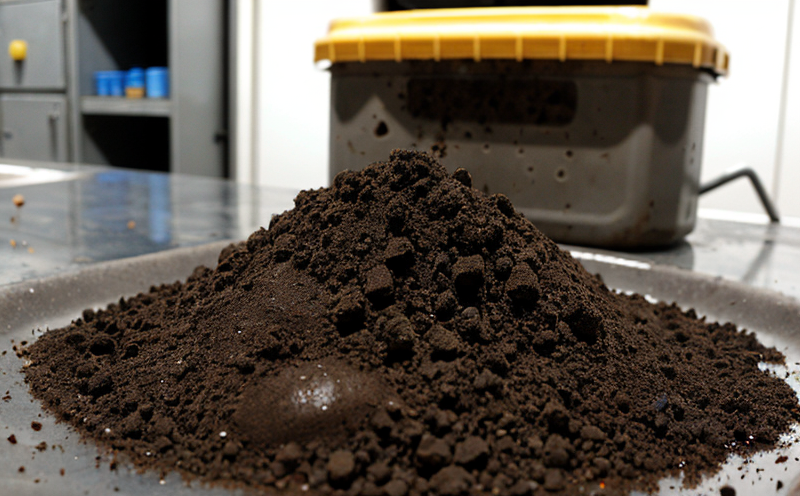EN 15890 Determination of Residues in Feed and Food
The European Standard EN 15890:2004 is a comprehensive method for the determination of residues in feedstuffs and food products. This standard covers a wide range of chemicals, pesticides, and contaminants that may be present in these materials. Our laboratory specializes in providing accurate and reliable analysis based on this standard to ensure compliance with international regulations.
The primary purpose of EN 15890 is to provide a standardized approach for the quantification of certain substances that could pose risks if consumed by animals or humans. This includes not only pesticides but also veterinary drug residues, heavy metals, and other potential contaminants. Compliance with this standard ensures product safety and protects public health.
Our laboratory employs state-of-the-art equipment and experienced scientists to perform these analyses meticulously. The process typically involves sample preparation, extraction using appropriate solvents, cleanup steps to remove interfering substances, and finally, analysis by various analytical techniques such as gas chromatography-mass spectrometry (GC-MS), liquid chromatography-tandem mass spectrometry (LC-MS/MS), or atomic absorption spectroscopy (AAS).
The standard specifies detailed procedures for each step of the process to ensure consistent and accurate results. It also provides guidance on how to interpret the data obtained from these analyses, including statistical evaluation methods that help in establishing whether detected levels are within acceptable limits.
Understanding the importance of this analysis extends beyond mere compliance; it plays a crucial role in maintaining trust among consumers who demand safe and wholesome products. By adhering strictly to EN 15890 standards, we contribute significantly towards safeguarding both animal welfare and human health.
In addition to providing accurate test results, our team offers valuable insights into potential issues identified during the analysis process. We can offer recommendations on how best practices could be implemented within your organization or supply chain to minimize risk factors associated with certain types of residues.
- International Acceptance: Compliance with EN 15890 ensures that our clients meet not only European Union requirements but also international standards recognized globally. This makes it easier for them to export their products without facing unnecessary barriers at borders or ports of entry.
- Safety Assurance: By adhering strictly to these rigorous testing protocols, we help maintain high standards of quality control throughout the supply chain from production through distribution and eventually consumption by end users.
Benefits
Adhering to EN 15890 offers numerous advantages for businesses involved in agriculture, livestock farming, pet food manufacturing, and other related sectors. Here are some key benefits:
- Regulatory Compliance: Ensures that all products meet strict regulatory requirements set forth by various governmental bodies around the world.
- Increase Consumer Confidence: Demonstrates commitment to producing safe and healthy food and feedstuffs, thereby enhancing brand reputation and consumer trust.
- Enhanced Reputation: Being able to demonstrate compliance with internationally recognized standards can significantly improve a company's standing within the industry.
- Better Decision Making: Provides valuable data that can inform strategic decisions regarding sourcing raw materials, product development, and marketing efforts aimed at meeting customer expectations.
International Acceptance and Recognition
The EN 15890 standard has gained widespread acceptance among countries across different regions due to its robustness and reliability. Here are some notable examples:
- European Union Member States: All EU member states require compliance with this standard for importation into the union.
- Brazil: Brazil mandates that imported animal feed products comply with EN 15890 before being allowed entry into its market.
- United States: While not mandatory, many American buyers prefer suppliers who can prove compliance through certification from accredited laboratories like ours.
- Australia and New Zealand: These countries also recommend conformity with EN 15890 for ensuring safe trade between nations.
Environmental and Sustainability Contributions
Compliance with EN 15890 contributes positively to environmental sustainability by promoting responsible practices in agriculture and food production. Some ways this occurs include:
- Reduction of Contamination: Identifying and eliminating harmful residues helps prevent pollution of soil, water bodies, and air.
- Sustainable Agriculture Practices: Encourages farmers to adopt more sustainable farming methods that reduce reliance on chemicals while maintaining productivity levels.
- Healthier Ecosystems: Minimizing exposure to harmful substances promotes healthier ecosystems which support biodiversity and overall ecological balance.





